Iran Denies Speeding Up Uranium Enrichment
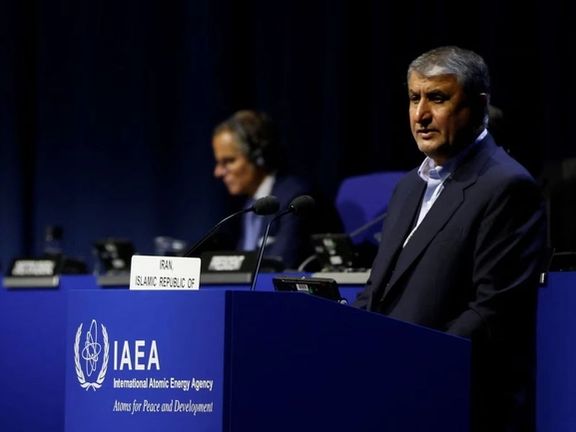
Iranian authorities have rejected the International Atomic Energy Agency's (IAEA) claims it has stepped up uranium enrichment, calling it "a media frenzy".

Iranian authorities have rejected the International Atomic Energy Agency's (IAEA) claims it has stepped up uranium enrichment, calling it "a media frenzy".
The head of Iran's Atomic Energy Organization, Mohammad Eslami, described the report as "political" and a ploy by the US and Israel to divert public attention from the ongoing conflict in Gaza.
The IAEA report, published by Reuters on Tuesday, indicates that Iran has resumed its uranium enrichment program after a short hiatus since mid-2023. It claims Iran currently enriches uranium up to 60% at its Pilot Fuel Enrichment Plant (PFEP) in the Natanz complex and its Fordow Fuel Enrichment Plant (FFEP) in a mountainous area.
Eslami insisted that the Islamic Republic was simply following its "current activities" as defined by international laws.
The White House called the report "very concerning". In a statement on Tuesday, a spokesperson for the National Security Council said: "Iran’s nuclear escalation is all the more concerning at a time when Iran-backed proxies continue their dangerous and destabilizing activities in the region, including the recent deadly drone attack and other attempted attacks in Iraq and Syria and the Houthi attacks against commercial shipping vessels in the Red Sea."
The tension between Tehran and Washington has escalated since Israeli forces allegedly killed a top IRGC commander in Syria this week with Iran-backed proxy groups stepping up attacks on US forces in the region.

While Iran’s ruler Ali Khamenei says he wants a high-turnout election in March, his followers show no intention to give a fair chance to their rivals, the Reformists.
In recent days, several politicians have suggested that the Reformists, who have been cut out the previous two elections, should nevertheless urge the apathetic voters to go to the polls.
Reformist groups feel the call for their participation is meaningless as nearly all their well-known candidates have been already disqualified by the Interior Ministry in the first round of a non-democratic vetting scheme. While the interior ministry can disqualify any person without offering a convincing reason, the Guardian Council takes a second stab and can equally disqualify more candidates.
Former lawmaker Morteza Alviri, a Reformist politician, told Khabar Online that key Reformist politicians such as former President Mohammad Khatami, Former Public Prosecutor Mohammad Khoiniha and former Interior Minister Abdollah Nouri's silence about the elections is in fact their protest action against the current situation.
Alviri, who served in parliament twice in the 1980s, explained that many prominent Reformist figures are reluctant to register their candidacy due to skepticism about the biased vetting system controlled by ultraconservatives. He added that the exclusion of Reformists in recent elections has left them disheartened. Despite Khamenei's call for political participation, Alviri believes that any Reformist who advocates for it risks damaging their reputation.
What Alviri did not mention is that, while Khamenei mildly criticized the Interior Ministry for disqualifying Reformist figures like the current MP for Tabriz, Massoud Pezeshkian, he refrained from advising the Guardian Council to approve the qualifications of any remaining Reformist candidates. This is likely because there are no significant Reformist candidates left for the Guardian Council to vet.
Other pro-reform political figures, such as Mohsen Hashemi, who say they are waiting for the Guardian Council's decision, belong to centrist parties such as the Executives of Construction.
These parties were not that popular with voters in the previous elections when they won less than 3 percent of the votes and the previous Presidential elections in which their members and supporters refused to work for the party's candidate former Central bank Governor Abdolnasser Hemmati. The former leader of the Executives of Construction Party Hossein Marashi has told the press that it was a mistake not to vote for Hemmati. it was a mistake that led to a major defeat for the party."
Some moderate figures such as former President Hassan Rouhani have said that if the majority of the people refuse to take part in the upcoming elections, that would be a great gift to hardliners who currently control the government and the parliament. However, Rouhani who appears to be heeding Khamenei's call for advocating participation, is said not to have enough suitable people around him to fill the list of 30 candidates for Tehran. His party members said he might give a list of only 16 moderate politicians.
Former reformist President Mohammad Khatami in previous years played a key role in encouraging the people to go to vote, but as Alviri has pointed out, the people are no longer so naïve as to listen to such advice. Khatami who is also sulking with the regime that has ignored him for so many years, is now even questioning the regime's legitimacy. He said in a recent statement to a women's human rights gathering in Tehran: "A political regime can be justified only when it can be reformed, and that is when it respects human dignity and gender equality."
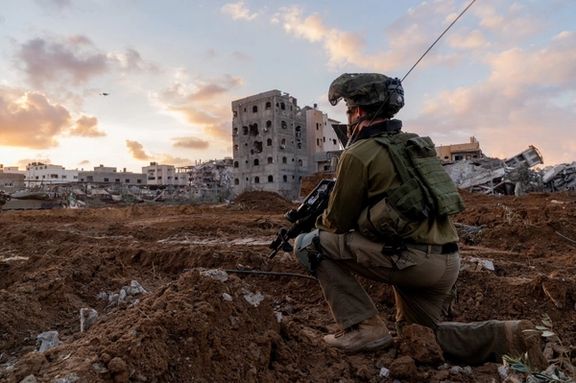
The Islamic Revolutionary Guard Corps (IRGC) says the October 7 attack by Hamas on Israel was a retaliatory action for the assassination of Qasem Soleimani.
According to the IRGC-affiliated Fars News Agency, in a press conference held on Wednesday, Ramezan Sharif, the spokesperson for the IRGC said "The Al-Aqsa Storm was one of the retaliations of the Axis of Resistance against the Zionists for the martyrdom of Qasem Soleimani," the man behind Iran's proxy activities across the region.
The claims contradict the regime's usual stance which has distanced itself from the attacks even though it has supported them and celebrated the tragedy. Tehran asserts Hamas acted independently, in spite of years of huge financial and military support given to the Gaza based militants from Tehran.
The terror attack which saw at least 1,200 mostly civilians killed and 240 more taken hostage, was the most deadly single day for Jews since the Holocaust and has since seen an escalation of tensions from Iran's proxies across the region, both attacking Iran and the US, in addition to blockading the Red Sea.
Soleimani, a key figure in Iran's external military and intelligence operations, was killed in a US drone strike near Baghdad International Airport on January 3, 2020.
Soleimani was accused by then-President Donald Trump of actively planning attacks on American diplomats and service members in the region. He played a crucial role in supporting and organizing militant proxy forces, including Lebanese Hezbollah and Iraqi Shiite militia groups.
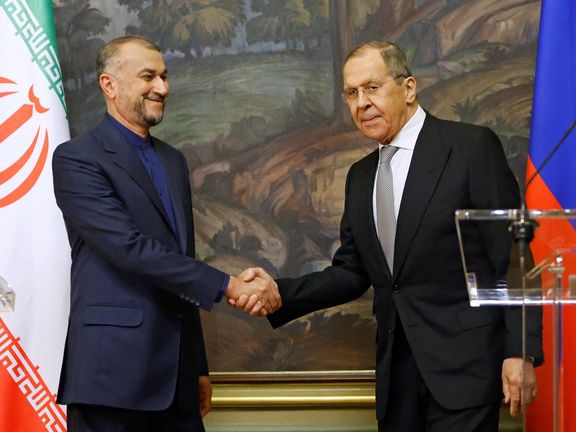
Iran and Russia's foreign ministers discussed the ongoing contentious issue of Iran's "territorial integrity" as the debate over three islands continues.
Iranian Foreign Minister Hossein Amir-Abdollahian and Russian counterpart Sergei Lavrov spoke Tuesday in the wake of the latest dispute between Iran and the United Arab Emirates' claims over three Persian Gulf islands, Abu Musa, Greater Tunb, and Lesser Tunb, which have historically been part of Iran as evidenced by historical and geographical documents.
However, the UAE has repeatedly claimed sovereignty over the islands, describing the situation as a “continuation of Iranian occupation.”
The Islamic Republic News Agency, IRNA, quoted Lavrov as saying that “Moscow is unwavering in its commitment to respecting Iran's territorial integrity,” but tensions flared following Russia’s recent move to sign a joint statement with the Gulf Cooperation Council (GCC) in Morocco in support of the UAE's right to file a lawsuit against Iran regarding the three contested islands.
Russia's decision to support the Arab claim is particularly humiliating to Supreme Leader Ali Khamenei, who has shown a particular affinity for Moscow and President Vladimir Putin. His policy has been to maintain close ties with Russia and China and to avoid opportunities to improve relations with the West.
China however also took a similar stance last year when it signed a joint statement with the GCC in which the UAE mentioned three Iranian islands in the Persian Gulf as a claim. But the backlash this time is more widespread, and it includes hard-liners as well.
Even Khamenei's most senior foreign policy adviser, former Foreign Minister Ali Akbar Velayati, criticized Russian behavior, saying, "Iran will not allow any foreign entity to intervene in its internal affairs."
In Tehran, legislators also expressed their dissatisfaction with Russia's stance, and some called for a serious review of Iran's foreign policy as well as a more comprehensive examination of the possible damages caused by these political maneuvers.
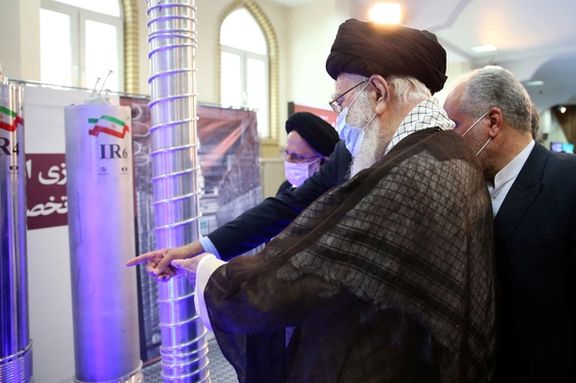
The White House says it is “greatly concerned” regarding the International Atomic Energy Agency (IAEA) report detailing Iran's heightened production of highly enriched uranium.
In a statement on Tuesday, a spokesperson for the National Security Council underscored the alarming nature of Iran's nuclear escalation, saying "Iran’s nuclear escalation is all the more concerning at a time when Iran-backed proxies continue their dangerous and destabilizing activities in the region, including the recent deadly drone attack and other attempted attacks in Iraq and Syria and the Houthi attacks against commercial shipping vessels in the Red Sea,"
The IAEA report, disclosed by Reuters on Tuesday, highlighted Iran's reversal of a prior slowdown in its uranium enrichment program since mid-2023, indicating an increase in the production of highly enriched uranium. The report revealed that Iran is currently enriching uranium up to 60% at both its Pilot Fuel Enrichment Plant (PFEP) in the Natanz complex and its Fordow Fuel Enrichment Plant (FFEP) situated within a mountain.
The report conveyed to member states that "since the end of November 2023, the rate at which Iran has been producing uranium enriched up to 60% U-235 at these two facilities combined has increased to approximately 9 kg per month." According to the IAEA's definition, once uranium enriched to 60% reaches around 42 kg, the possibility of using it to create a nuclear bomb cannot be dismissed. Currently, Iran possesses sufficient uranium enriched to 60% to potentially manufacture three nuclear bombs if subjected to further enrichment.
Responding to the IAEA report on Wednesday, Mohammad Eslami, Iran's atomic energy chief, dismissed the findings, asserting, "There is nothing new." Eslami emphasized that Iran had not introduced any new elements and is conducting its activities in accordance with established rules, as reported by Iranian media.
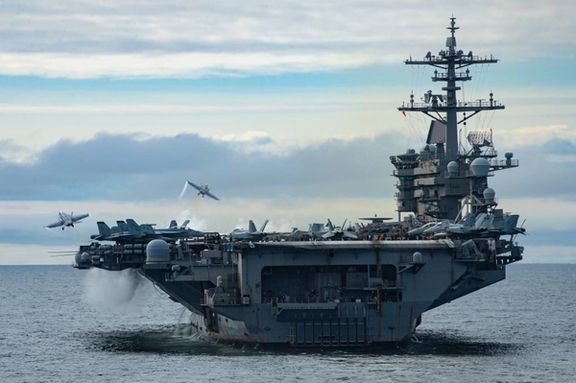
The US fleet in the Red Sea intercepted 17 drones and missiles on Tuesday, as Iranian officials promised to hit back at Israel for the killing of Iran’s ‘top man’ in Syria.
Escalation was palpable during the day, as destroyers and fighter jets from the USS Eisenhower were forced to shoot down “twelve one-way attack drones, three anti-ship ballistic missiles, and two land attack cruise missiles” in the Red Sea –all fired by Iran-backed Houthis in 10 hours, according to the US Central Command.
In Tehran, spokesmen for Iran’s government and Iran’s defense ministry repeated what seems to be the regime’s chosen message now: There will be a response to Israel’s killing of Razi Mousavi “at the right time and the right place.”
Razi Mousavi (aka Seyyed Razi) was killed by a direct Israeli airstrike Monday. He headed IRGC’s ‘logistics’ and military coordination in Syria, which may be better understood as being in charge of getting weapons or money for Iran-backed forces in Syria and Lebanon.
He had been active in Syria for more than 25 years, and had escaped multiple Israeli attempts on his life, according to reports in IRGC-affiliated media.
“This crime definitely deserves punishment. Israelis must pay the price for their recent terrorist actions,” said Reza Talaei-nik, Iran’s defense ministry spokesman in a press conference Tuesday. “Iran will give a smart and strong response to the Israeli strike at the appropriate time and place.”
There’s no clear indication of what a ‘response’ would look like. It is rather clear, however, that both the rhetoric and the action is intensifying on all sides.
And that includes the United States.
On Monday, President Biden ordered the US military to hit Iran-affiliated targets in Iraq almost immediately after drone attacks on a US base that left one American soldier critically injured. It was a swift response from an administration that has appeared reluctant to respond to more than 100 attacks by Iran-backed militias in Iraq and Syria.
But it doesn’t seem to have satisfied the critics –who want Joe Biden to “change course” completely and sharply.
“Retaliatory strikes are a reaction. We need to be proactive,” said Rep. Rob Wittman on Fox News Tuesday. “We need to go after where we know these attacks are coming from… The failed policy of capitulating to Iran is manifesting itself in what we’re seeing Iran doing in the region.”
The Biden administration may find it harder to cease fire if the current trajectory persists. Harsher attacks on US troops in Syria and Iraq, growing attacks on vessels in the Red Sea, and a potential act of belligerence from Iran –as seen in the strike on the oil tanker in the Indian Ocean last week– these would all push President Biden away from his de-escalation policy and towards confrontation with Iran.
“The irony is the non-escalation approach is actually making Iran more wealthy to further fuel terrorism in the region,” Rep. Mike Waltz said on Fox News Tuesday. “We’re not hitting back on things that Iran cares about.”
Would that not mean dragging US troops (and the US taxpayer) into yet another costly war riddled with uncertainty?
“I want to be clear: that’s not for some major military escalation,” explained Rep. Mike Waltz. “Reverse-course on Iran policy, go back to maximum pressure and dry up their coffers that are fueling terrorism across the region.”